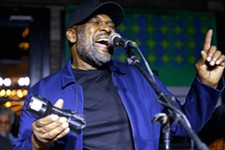Eight Things That Hip-Hop Taught America
SXSW panels
Reviewed by Thomas Fawcett, Fri., March 18, 2011
Eight Things That Hip-Hop Taught America
Austin Convention Center, Wednesday, March 16Hip-hop's phenomenal rise and the ways in which beats and rhymes have changed the country that birthed it is finally coming to the fore. Using The Big Payback: The History of the Business of Hip-Hop as his guide, author Dan Charnas argued that hip-hop contributed to the desegregation of the music business, the browning of Hollywood, and the election of Barack Obama. Charnas posited that hip-hop was born in an unusually hostile environment for black music, one where, "You wouldn't even hear R&B on pop radio, unless of course it was recorded by Robert Palmer." Despite that, hip-hop gave rise to such artist-moguls as Sean Combs and Jay-Z, who completely changed the game. "There was such an intensity about him," recalled Rob Stone, who sat in a board room as Puffy outlined his blueprint for success. "I left that meeting thinking this guy is going to change the course of hip-hop, and he did." "It starts with the idea that a black artist can also be the biggest pop culture force," added Rap Radar CEO and Ego Trip founder Elliott Wilson. "At the end of the day, if hip-hop is the prevailing thing in pop culture, pop culture has to move in a direction that reflects that."













